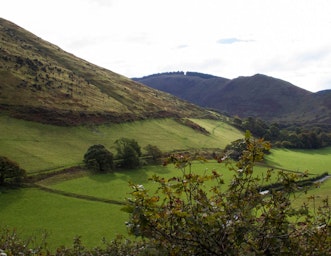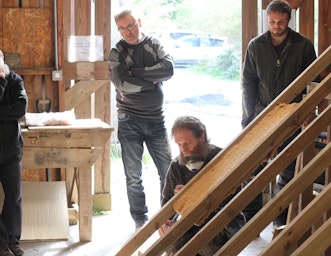
In the second part of our reflections series we hear from our Development and Communications team who were at COP26. After two weeks of discussion, debate and protest, we asked them for their thoughts on the conference. Some chose to take an initial look at the Glasgow Climate Pact, adopted after intense negotiations from the nearly 200 countries in attendance, while others highlighted some of the inspirational events they attended.
You can read an overview of the decisions, agreements and deals reached at COP26 on our recent blog.
Eileen Kinsman – Head of Development
COP26 took place at the beginning of the crucial decade for climate action. In ‘Earth to COP’, a short film shown at the opening plenary sessions, world leaders witnessed the increasingly severe impacts of climate change around the globe.
As the Prime Minister of Barbados, Mia Mottley, so poetically put it:
“Code Red
Code Red to the G7 Countries
Code Red
Code Red to the G20
Earth to COP Earth to COP
For those who have eyes to see
For those who have ears to listen
And for those who have a heart to feel
1.5 is what we need to survive
The difference between 1.5 and 2 degrees will be paid in lives and livelihoods”
The human cost was brought home to us a few days later. We got lost whilst running from the Blue Zone to the Green Zone to attend the Ashden Awards. We started chatting to someone else who was also lost, and I asked her why she was at COP. She said that her daughter, Ella, died in 2013 from air pollution. How do you respond to that? The woman was Rosamund Adoo-Kissi-Debrah, tireless environmental campaigner.
As Sir David Attenborough so movingly narrated at the opening of COP26, the story of climate change is a story of inequality. Those who have contributed least to the problem are the most impacted. But, as he said, we can rewrite the story. We know how to solve the problem. As CAT’s Zero Carbon Britain research has shown, we have the solutions.
At COP we had the opportunity to share our zero carbon solutions: in a private meeting with UK Government; in a wider platform in the Welsh Government’s only slot in the UK Presidency Pavilion; in side events in the Blue Zone; and in conversations with governments, NGOs, businesses and representatives from communities around the globe in the Blue and Green Zones and the streets of Glasgow.
As David Attenborough said – our motivation should not be fear, but hope.

Freya Randall – Fundraising Manager for CAT, attending COP26 to take part in the Global Day of Action and People’s Summit
By coming to Glasgow for COP26 I wanted to proactively address my fears of empty rhetoric around ever more ambitious deals, promises, pledges and targets.
My experience offered me some unique insights – I connected with sister movements within the amazing COP26 Coalition and heard from many diverse voices of indigenous communities. Hearing first-hand of how climate change affects the most vulnerable communities and how their experiences are largely silenced really hit home.
One event I attended as part of the People’s Summit was simple story-telling. We heard from a Samoan woman and her great uncle about their connection to his land. We heard (through translation) from elders from the Americas – how tokenistic they felt their roles had been inside the Blue Zone. There was song, dance, and exchange of gifts – it was a special, almost spiritual evening, totally at odds with the seminar rooms of the Blue Zone.
I came away from COP feeling a mix of despondency from the official deals but also motivation for my role at CAT and in various campaign groups. Ultimately, I am very glad I went.
Meg Stuart – Short Courses Marketing Officer for CAT, attending COP26 as a volunteer for the COP26 Coalition
Outside of the Blue and Green Zones, civil society events across Glasgow and online created a crucial opportunity for collective action on climate justice. COP26 Coalition’s People’s Summit offered talks, workshops and spaces for voices and topics not often heard in mainstream climate discourse.
We heard global climate justice leaders who are already seeing devastating effects on their communities speak about how they are fighting, lobbying and organising for change. Sheila Babuata, from the Micronesia Climate Change Alliance, spoke passionately on loss and damage in the Mariana islands and the community and youth actions that inspire them. Farzana Faruk Jhuma and Mitzi Jonelle Tan of Fridays for Future MAPA (Most Affected People and Areas) spoke of the need for reparations and finance to make just transitions possible.
These leaders and many others detailed how horrific and entwined the multiple issues are, and there was a general feeling that many of the solutions offered during the main negotiations were greenwashing, business as usual and fantasy. A sense of incredible understanding and solidarity united those present and those who had been excluded from official proceedings. The civil society spaces created and nurtured this atmosphere and energy for collective action, which, along with systemic change at the government and policy level, will be crucial for enabling and enacting change in the coming decade.
- Zero Carbon Britain
- Climate Change
Related Topics
Related Pages
Related news


CAT Conversations: Sandy Stevens, CAT graduate
17th April 2025
CAT stories – Nick Parsons and Mike Russell
29th January 2025
‘The finance COP’
29th November 2024EMAIL SIGN UP
Keep up to date with all the latest activities, events and online resources by signing up to our emails and following us on social media. And if you'd like to get involved and support our work, we'd love to welcome you as a CAT member.
